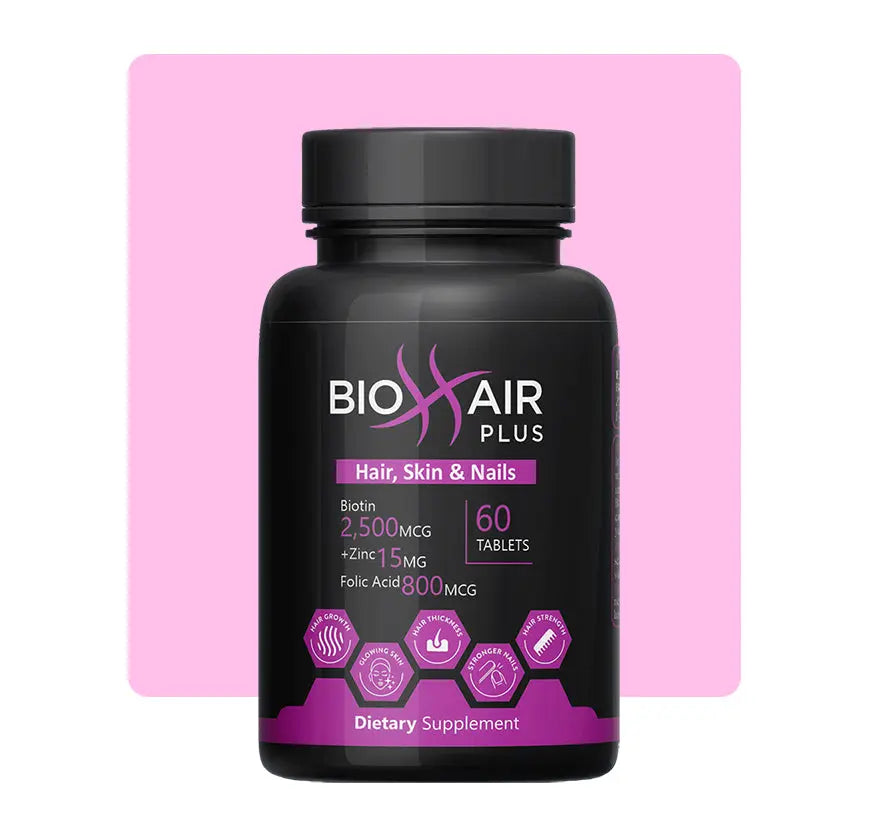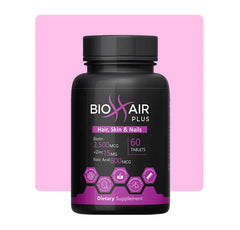

Biohair Plus (60 Tablets)
- Rs.1,490.00
- Rs.1,490.00
- Unit price
- per
Biotin, also known as vitamin B7 or vitamin H, is a water-soluble vitamin that plays a crucial role in various metabolic processes in the human body. It is a part of the B-vitamin complex and is essential for the metabolism of carbohydrates, fats, and proteins. Here are some key aspects of biotin:
-
Role in Metabolism: Biotin is a cofactor for several enzymes involved in the metabolism of macronutrients. It helps convert food into energy by facilitating the breakdown of carbohydrates, fats, and proteins.
-
Hair, Skin, and Nail Health: Biotin is often associated with promoting healthy hair, skin, and nails. While research on the specific benefits for these areas is limited, some people take biotin supplements to support their overall beauty and wellness.
-
Sources of Biotin: Biotin is naturally found in a variety of foods, including eggs, nuts, seeds, whole grains, and certain vegetables. Additionally, the bacteria in the gut can also produce biotin.
-
Biotin Deficiency: Biotin deficiency is rare, as the vitamin is widely available in many foods and is produced by gut bacteria. However, certain conditions or medications may interfere with its absorption. Symptoms of deficiency can include hair loss, skin rash, and neurological problems.
-
Supplementation: Biotin supplements are available over-the-counter and are commonly used for hair, skin, and nail health. It's important to note that excessive biotin intake can interfere with certain laboratory tests, leading to inaccurate results. Therefore, it's advisable to inform healthcare professionals about biotin supplementation if undergoing medical tests.
-
Recommended Daily Intake: The recommended daily intake of biotin varies depending on factors such as age, sex, and life stage. In general, adults are advised to consume around 30 to 100 micrograms per day.
It's essential to obtain nutrients from a balanced diet, and while biotin is important for health, most people can meet their daily requirements through a normal, varied diet. If you have concerns about your biotin levels or are considering supplementation, it's always best to consult with a healthcare professional for personalized advice.
Zinc is an essential trace element that plays a crucial role in various physiological processes in the human body, including immune function, wound healing, DNA synthesis, and protein synthesis. It is also involved in the maintenance of skin, hair, and nails. Adequate levels of zinc are necessary for the proper functioning of enzymes and proteins that contribute to hair growth and maintenance.
The concentration of zinc in hair is often analyzed as a potential indicator of the body's zinc status over an extended period. However, the interpretation of hair zinc levels is not straightforward, and results may be influenced by various factors.
Here are a few points to consider regarding zinc levels in hair:
-
Nutritional Status: Hair zinc levels are thought to reflect long-term zinc intake and nutritional status. However, they may not provide a real-time representation of recent dietary changes or acute zinc deficiency.
-
Variability: Hair zinc levels can vary among individuals and may be influenced by factors such as age, sex, ethnicity, and hair color. Additionally, external factors like exposure to environmental contaminants or hair care products can affect the accuracy of measurements.
-
Diagnostic Value: While hair zinc analysis is used in research and clinical settings to assess nutritional status, it is not the sole determinant for diagnosing zinc deficiency. Serum zinc levels and other clinical indicators are often considered alongside hair zinc levels for a comprehensive assessment.
-
Limitations: The interpretation of hair zinc levels is subject to ongoing research, and there is no universally agreed-upon standard for what constitutes normal or deficient levels.
If you are concerned about your zinc levels or experiencing symptoms of a deficiency, it's advisable to consult with a healthcare professional. They can perform a comprehensive assessment, including blood tests and a review of your medical history, to determine your zinc status accurately.
Maintaining a balanced and nutritious diet is crucial for overall health, including the health of your hair. Foods rich in zinc include meat, nuts, seeds, dairy products, and whole grains. If there are concerns about zinc intake, a healthcare provider can provide guidance on dietary adjustments or supplementation if necessary.
Related Products
Recently Viewed Products
- Choosing a selection results in a full page refresh.





